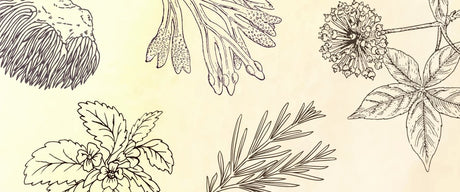Native to North America, Europe, China and Japan, Lion’s Mane (Hericium erinaceus) is one of nature's most dynamic brain foods. Historically known as an edible mushroom, it is easily identified by its white, cascading spines that resemble the mane of a lion. This nootropic mushroom has a rich history of traditional use, along with scientific research to back up its health claims.
Disclaimer: This blog is for educational purposes only and is not a substitute for medical advice. Please consult your health care practitioner before adding any new herbs to your wellness routine.
Understanding Nootropics
More recently, Lion’s Mane has been a trending functional mushroom and superfood. Because of its ability to support mental clarity, it falls into a class of brain-boosters called nootropics.
Nootropics are natural compounds that enhance brain and cognitive function. They unlock creativity, sharpen focus, enhance productivity, and banish brain fog. Traditional healing systems have been singing the praises of this mushroom for thousands of years.
Folklore
In Chinese folklore, it is said that consuming Lion’s Mane mushroom promotes “nerves of steel and the memory of a lion.” Hericium erinaceus has a long history of therapeutic use in Traditional Chinese and Japanese Medicine. In TCM, Lion’s Mane is used to nourish the gut, fortify the spleen, and treat chronic immune deficiencies. Practitioners also use it to restore vigor to patients experiencing “qi deficiency,” or lack of life force.
5 Incredible Benefits of Lion’s Mane
- Improves cognitive function, memory, focus, and mental clarity.
- Supports neural health and nerve regeneration.
- Eases anxiety and supports a healthy stress response.
- Modulates the immune system and helps the body fight infection.
- Fortifies digestive health.
What the Research Says
Recent studies have concluded that consistent use of Lion’s Mane can help with mental focus, productivity, and mood. This mushroom even shows promise as a treatment for degenerative diseases like Alzheimer's.
Nerve Support
Lion’s Mane has received special attention for its ability to support nerve regeneration. It stimulates the synthesis of Nerve Growth Factor (NGF), a protein that helps maintain healthy neurons (1). NGF plays an essential role in maintaining neurological health, homeostasis, and the immune system.
Mental Clarity
There have been several studies done using Lion's Mane to treat neurodegenerative diseases such as Multiple Sclerosis, Parkinson’s, and Alzheimer’s. Results vary but show compelling evidence that supports improved myelination of nerve fibers. Results also show suppression of the inflammatory process responsible for brain damage (2).
Mental Wellness
Research suggests that Lion’s Mane has significant anxiety and depression reducing effects. One study had thirty women take either a Lion’s Mane cookie or placebo cookie for 4 weeks. Those taking Lion’s Mane showed lower scores on the Center for Epidemiologic Studies Depression Scale and improved sleep quality on the Pittsburgh Sleep Quality Index (3).
Digestive Wellness
Lion’s Mane fruiting body extracts have been shown to be effective for treating stomach ulcers (4). They may also prevent ulcers from developing by inhibiting the growth of H. Pylori and protecting the stomach lining from damage (5).
Curious to learn more about nootropics? Check out this webinar hosted by our Co-Founder, Yarrow Willard and discover the best herbs for supporting mind and mood.


























